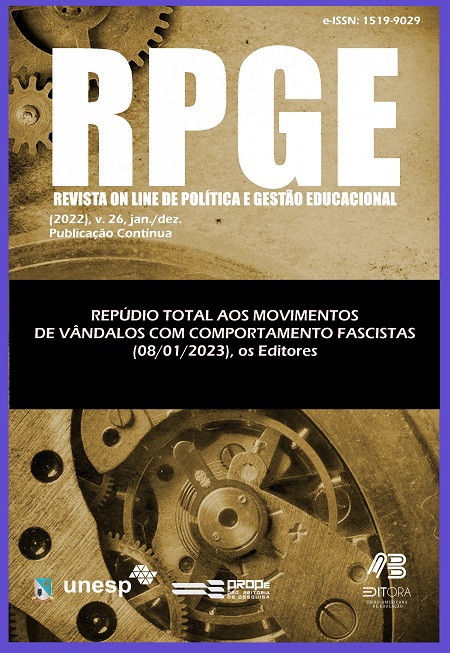Medicalization phenomenon in schools
Teachers’ social representations
DOI:
https://doi.org/10.22633/rpge.v26i00.16461Keywords:
Alunos(as), Professores(as), Medicalização, Representações sociais, Política EducacionalAbstract
This article presents the results of a research that aimed to find out what are the social representations of teachers about the phenomenon of medicalization in schools and its possible repercussions on educational policies to think about children's health in their learning process. We interviewed 72 teachers who work in early childhood education and the first phase of elementary education in public and private schools in a city in the interior of Goiás, using a semi-structured script. Data were processed using the IRAMUTEQ software. The analyzes interrelated the contributions between Social Psychology, specifically TRS, Educational Psychology and Educational Policy. The social representations identified are about the consideration and belief in the use of medication by children as an important factor for the progress of educational practice; a systemic problem generated by capitalism, which is affecting the school teaching-learning process and the population's own health.
Downloads
References
COLLARES, C. A. L.; MOYSÉS, M. A. Controle e medicalização da infância. Desidades: Revista Eletrônica de Divulgação Científica da Infância e Juventude, Rio de Janeiro, n. 1, p. 11-21, 2013. Disponível em https://revistas.ufrj.br/index.php/desidades/article/view/2456. Acesso em: 11 nov. 2021.
COSTA, T. S. et al. Papel do professor face à medicalização: estudo exploratório no território brasileiro. Psicologia da Educação, São Paulo, v. 49, p. 89-97, 2019. Disponível em: http://pepsic.bvsalud.org/pdf/psie/n49/n49a10.pdf. Acesso em: 11 nov. 2021.
JODELET, D. Representações Sociais: um domínio em expansão. In: JODELET, D. (org.). As Representações Sociais. Rio de Janeiro: EdUERJ, 2001.
LIBÂNEO, J. C. Organização e gestão da escola: teoria e prática. 6. ed. São Paulo: Heccus, 2015.
MOYSÉS, M.A.A. A institucionalização do invisível: crianças que não aprendem na escola. São Paulo: Mercado das Letras, 2001.
SANTOS, G. B.; As estratégias de fuga e enfrentamento frente às adversidades do trabalho docente. Estudos e Pesquisas em Psicologia, v. 6, p. 1-6, 2006. Disponível em: https://www.e-publicacoes.uerj.br/index.php/revispsi/article/view/11090. Acesso em 11 nov. 2021.
VALLE, L. E. L. R. Psicologia Escolar: Um duplo desafio. Psicologia Ciência e Profissão, Brasília, v. 23, n. 1, p. 22-29, 2003. Disponível em: https://www.scielo.br/j/pcp/a/Sz5HSBxWXt7Ch7M4DzRrLsx/abstract/?lang=pt. Acesso em: 11 nov. 2021.
ZUCOLOTO P. C. S. V.; PATTO M. H. S. O médico higienista na escola: as origens históricas da medicalização do fracasso escolar. Revista Brasileira de Crescimento e Desenvolvimento Humano, São Paulo, v. 17, n. 1, p. 136-145, abr. 2007. Disponível em: http://pepsic.bvsalud.org/scielo.php?script=sci_arttext&pid=S0104-12822007000100014&lng=pt&nrm=iso. Acesso em: 11 nov. 2021.
Published
How to Cite
Issue
Section
License
Copyright (c) 2022 Revista on line de Política e Gestão Educacional

This work is licensed under a Creative Commons Attribution-NonCommercial-ShareAlike 4.0 International License.
Manuscritos aceitos e publicados são de propriedade da Revista on line de Política e Gestão Educacional. É vedada a submissão integral ou parcial do manuscrito a qualquer outro periódico. A responsabilidade do conteúdo dos artigos é exclusiva dos autores. É vedada a tradução para outro idioma sem a autorização escrita do Editor ouvida a Comissão Editorial Científica.











